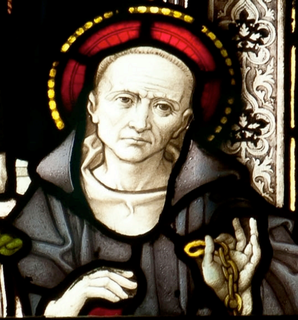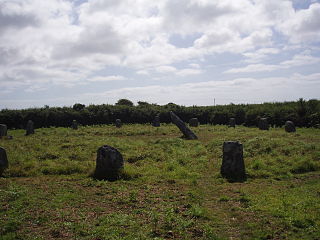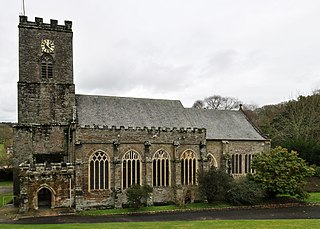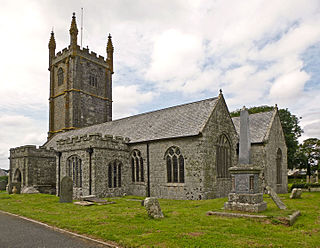
Saint Piran or Pyran, died c. 480, was a 5th-century Cornish abbot and saint, of Irish origin. He is the patron saint of tin-miners, and is also generally regarded as the patron saint of Cornwall, although Saint Michael and Saint Petroc also have some claim to this title.

Saint Petroc or Petrock was a British prince and Christian saint.

St Keverne is a civil parish and village on The Lizard in Cornwall, England, United Kingdom.

The history of Cornwall goes back to the Paleolithic, but in this period Cornwall only had sporadic visits by groups of humans. Continuous occupation started around 10,000 years ago after the end of the last ice age. When recorded history started in the first century BCE, the spoken language was Common Brittonic, and that would develop into Southwestern Brittonic and then the Cornish language. Cornwall was part of the territory of the tribe of the Dumnonii that included modern-day Devon and parts of Somerset. After a period of Roman rule, Cornwall reverted to rule by independent Romano-British leaders and continued to have a close relationship with Brittany and Wales as well as southern Ireland, which neighboured across the Celtic Sea. After the collapse of Dumnonia, the remaining territory of Cornwall came into conflict with neighbouring Wessex.
Breage or Breaca is a saint venerated in Cornwall and southwestern Britain. According to her late hagiography, she was an Irish nun of the 5th or 6th century who founded a church in Cornwall. The village and civil parish of Breage in Cornwall are named after her, and the local Breage Parish Church is dedicated to her. She is a saint in the Orthodox Church and Roman Catholic Church.

Brychan Brycheiniog was a legendary 5th-century king of Brycheiniog in Mid Wales.

The culture of Cornwall forms part of the culture of the United Kingdom, but has distinct customs, traditions and peculiarities. Cornwall has many strong local traditions. After many years of decline, Cornish culture has undergone a strong revival, and many groups exist to promote Cornwall's culture and language today.
Charles Gordon Henderson was a historian and antiquarian of Cornwall.
Felec or Felix was an obscure 5th- or 6th-century British saint active in Cornwall. The church of St Felicitas and St Piala's Church, Phillack near Hayle is dedicated to Saint Felec. Later generations mistook him for the female Saint Felicity of Rome.

Saint Buriana was a 6th-century Irish saint, a hermit in St Buryan, near Penzance, Cornwall. Baring-Gould identifies her with the Irish Saint Bruinsech.
Saint Kea was a late 5th-century British saint from the Hen Ogledd —the Brythonic-speaking parts of what is now southern Scotland and northern England. According to tradition he was chiefly active in Cornwall, Devon and Brittany, and his cult was popular in those regions as well as throughout Wales and the West Country. St Fili or Filius, to whom the parish church of Philleigh is dedicated, probably came from Wales and is said to have been a companion of St Kea.

Crowan is a village and civil parish in Cornwall, United Kingdom. It is about three-and-a-half miles (6 km) south of Camborne. A former mining parish, all of the mines had shut by 1880.

Germoe is a village and civil parish in Cornwall, England, United Kingdom. Germoe village, the parish's main settlement and church town, is about five miles (8 km) west of Helston and seven miles (11.3 km) east of Penzance. The A394 Penzance to Helston road runs along the southern border of the parish. Other settlements in the parish include Balwest, Boscreege and Tresowes Green.

Saint Cybi or Saint Cuby was a 6th-century Cornish bishop, saint and, briefly, king, who worked largely in North Wales: his biography is recorded in two slightly variant medieval 'lives'.

Mabyn, also known as Mabena, Mabon, etc., was a medieval Cornish saint. According to local Cornish tradition she was one of the many children of Brychan, king of Brycheiniog in Wales in the 5th century. The village and civil parish of St Mabyn is named for her, and the local St Mabyn Parish Church is dedicated to her.

Christianity in Cornwall began in the 4th or 5th century AD when Western Christianity was introduced into Cornwall along with the rest of Roman Britain. Over time it became the official religion, superseding previous Celtic and Roman practices. Early Christianity in Cornwall was spread largely by the saints, including Saint Piran, the patron of the county. Cornwall, like other parts of Britain, is sometimes associated with the distinct collection of practices known as Celtic Christianity but was always in communion with the wider Catholic Church. The Cornish saints are commemorated in legends, churches and placenames.

Breage Parish Church is the Anglican parish church of the parish of Breage, Cornwall, England, United Kingdom. It is dedicated to Saint Breage or Breaca, said to have been an Irish nun who came to Cornwall in the 5th-century.
Elwen was the name of an early saint or saints venerated in Cornwall and Brittany. The hagiographical material asserts that he came to Cornwall from Ireland in the company of Breage and six others, but this is attested late. A chapel at Porthleven in Sithney parish, Cornwall, dedicated to Elwen, existed from the 13th century until 1549, and in Brittany several sites and placenames are associated with possibly related figures.
Mybbard and Mancus were two Cornish saints of the 6th century.













